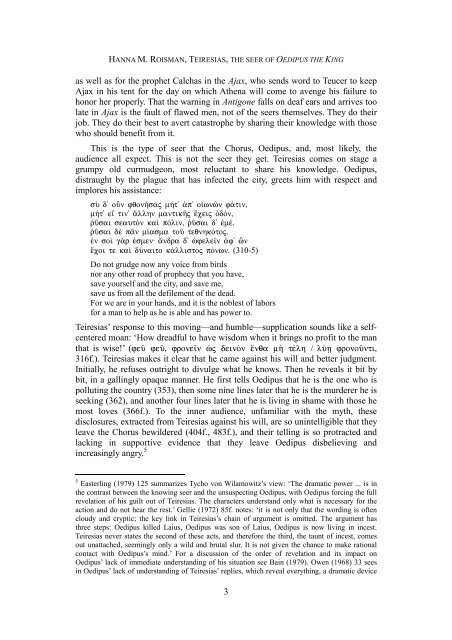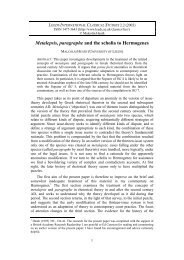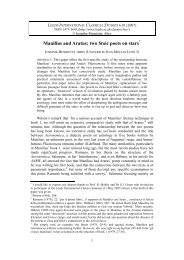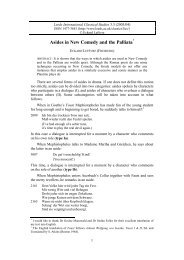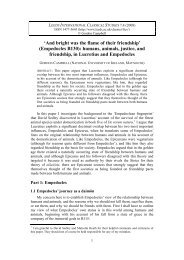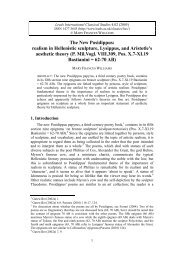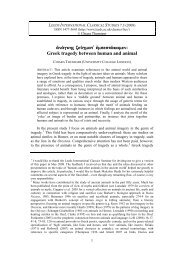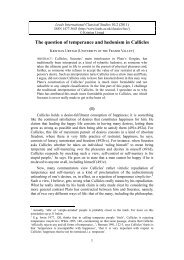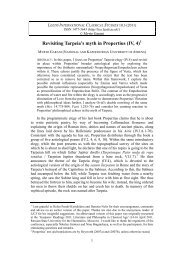Teiresias, the seer of Oedipus the King - Leeds International ...
Teiresias, the seer of Oedipus the King - Leeds International ...
Teiresias, the seer of Oedipus the King - Leeds International ...
You also want an ePaper? Increase the reach of your titles
YUMPU automatically turns print PDFs into web optimized ePapers that Google loves.
HANNA M. ROISMAN, TEIRESIAS, THE SEER OF OEDIPUS THE KING<br />
as well as for <strong>the</strong> prophet Calchas in <strong>the</strong> Ajax, who sends word to Teucer to keep<br />
Ajax in his tent for <strong>the</strong> day on which A<strong>the</strong>na will come to avenge his failure to<br />
honor her properly. That <strong>the</strong> warning in Antigone falls on deaf ears and arrives too<br />
late in Ajax is <strong>the</strong> fault <strong>of</strong> flawed men, not <strong>of</strong> <strong>the</strong> <strong>seer</strong>s <strong>the</strong>mselves. They do <strong>the</strong>ir<br />
job. They do <strong>the</strong>ir best to avert catastrophe by sharing <strong>the</strong>ir knowledge with those<br />
who should benefit from it.<br />
This is <strong>the</strong> type <strong>of</strong> <strong>seer</strong> that <strong>the</strong> Chorus, <strong>Oedipus</strong>, and, most likely, <strong>the</strong><br />
audience all expect. This is not <strong>the</strong> <strong>seer</strong> <strong>the</strong>y get. <strong>Teiresias</strong> comes on stage a<br />
grumpy old curmudgeon, most reluctant to share his knowledge. <strong>Oedipus</strong>,<br />
distraught by <strong>the</strong> plague that has infected <strong>the</strong> city, greets him with respect and<br />
implores his assistance:<br />
sÝ d' oân fqon»saj m»t' ¢p' o„wnîn f£tin,<br />
m»t' e‡ tin' ¥llhn mantikÁj œceij ÐdÒn,<br />
·àsai seautÕn kaˆ pÒlin, ·àsai d' mš.<br />
·àsai d p©n m…asma toà teqnhkÒtoj.<br />
n soˆ g£r smen: ¥ndra d' çfele‹n ¢f' ïn<br />
œcoi te kaˆ dÚnaito k£llistoj pÒnwn. (310-5)<br />
Do not grudge now any voice from birds<br />
nor any o<strong>the</strong>r road <strong>of</strong> prophecy that you have,<br />
save yourself and <strong>the</strong> city, and save me,<br />
save us from all <strong>the</strong> defilement <strong>of</strong> <strong>the</strong> dead.<br />
For we are in your hands, and it is <strong>the</strong> noblest <strong>of</strong> labors<br />
for a man to help as he is able and has power to.<br />
<strong>Teiresias</strong>’ response to this moving—and humble—supplication sounds like a selfcentered<br />
moan: ‘How dreadful to have wisdom when it brings no pr<strong>of</strong>it to <strong>the</strong> man<br />
that is wise!’ (feà feà, frone‹n æj deinÕn œnqa m¾ tšlh / lÚV fronoànti,<br />
316f.). <strong>Teiresias</strong> makes it clear that he came against his will and better judgment.<br />
Initially, he refuses outright to divulge what he knows. Then he reveals it bit by<br />
bit, in a gallingly opaque manner. He first tells <strong>Oedipus</strong> that he is <strong>the</strong> one who is<br />
polluting <strong>the</strong> country (353), <strong>the</strong>n some nine lines later that he is <strong>the</strong> murderer he is<br />
seeking (362), and ano<strong>the</strong>r four lines later that he is living in shame with those he<br />
most loves (366f.). To <strong>the</strong> inner audience, unfamiliar with <strong>the</strong> myth, <strong>the</strong>se<br />
disclosures, extracted from <strong>Teiresias</strong> against his will, are so unintelligible that <strong>the</strong>y<br />
leave <strong>the</strong> Chorus bewildered (404f., 483f.), and <strong>the</strong>ir telling is so protracted and<br />
lacking in supportive evidence that <strong>the</strong>y leave <strong>Oedipus</strong> disbelieving and<br />
increasingly angry. 5<br />
5 Easterling (1979) 125 summarizes Tycho von Wilamowitz’s view: ‘The dramatic power ... is in<br />
<strong>the</strong> contrast between <strong>the</strong> knowing <strong>seer</strong> and <strong>the</strong> unsuspecting <strong>Oedipus</strong>, with <strong>Oedipus</strong> forcing <strong>the</strong> full<br />
revelation <strong>of</strong> his guilt out <strong>of</strong> <strong>Teiresias</strong>. The characters understand only what is necessary for <strong>the</strong><br />
action and do not hear <strong>the</strong> rest.’ Gellie (1972) 85f. notes: ‘it is not only that <strong>the</strong> wording is <strong>of</strong>ten<br />
cloudy and cryptic; <strong>the</strong> key link in <strong>Teiresias</strong>’s chain <strong>of</strong> argument is omitted. The argument has<br />
three steps: <strong>Oedipus</strong> killed Laius, <strong>Oedipus</strong> was son <strong>of</strong> Laius, <strong>Oedipus</strong> is now living in incest.<br />
<strong>Teiresias</strong> never states <strong>the</strong> second <strong>of</strong> <strong>the</strong>se acts, and <strong>the</strong>refore <strong>the</strong> third, <strong>the</strong> taunt <strong>of</strong> incest, comes<br />
out unattached, seemingly only a wild and brutal slur. It is not given <strong>the</strong> chance to make rational<br />
contact with <strong>Oedipus</strong>’s mind.’ For a discussion <strong>of</strong> <strong>the</strong> order <strong>of</strong> revelation and its impact on<br />
<strong>Oedipus</strong>’ lack <strong>of</strong> immediate understanding <strong>of</strong> his situation see Bain (1979). Owen (1968) 33 sees<br />
in <strong>Oedipus</strong>’ lack <strong>of</strong> understanding <strong>of</strong> <strong>Teiresias</strong>’ replies, which reveal everything, a dramatic device<br />
3


